September 20, 2013
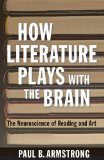
How Literature Plays with the Brain: The Neuroscience of Reading and Art by Paul B. Armstrong (Johns Hopkins University Press, 2013)
(kindle ed.), (amazon.co.uk)
Book description from the publisher:
“Literature matters,” says Paul B. Armstrong, “for what it reveals about human experience, and the very different perspective of neuroscience on how the brain works is part of that story.” In How Literature Plays with the Brain, Armstrong examines the parallels between certain features of literary experience and functions of the brain. His central argument is that literature plays with the brain through experiences of harmony and dissonance which set in motion oppositions that are fundamental to the neurobiology of mental functioning. These oppositions negotiate basic tensions in the operation of the brain between the drive for pattern, synthesis, and constancy and the need for flexibility, adaptability, and openness to change.
The challenge, Armstrong argues, is to account for the ability of readers to find incommensurable meanings in the same text, for example, or to take pleasure in art that is harmonious or dissonant, symmetrical or distorted, unified or discontinuous and disruptive.
How Literature Plays with the Brain is the first book to use the resources of neuroscience and phenomenology to analyze aesthetic experience. For the neuroscientific community, the study suggests that different areas of research—the neurobiology of vision and reading, the brain-body interactions underlying emotions—may be connected to a variety of aesthetic and literary phenomena. For critics and students of literature, the study engages fundamental questions within the humanities: What is aesthetic experience? What happens when we read a literary work? How does the interpretation of literature relate to other ways of knowing?
Google Books preview (scroll past blank page):
See also: Author’s webpage
Comments (2)
- cognitive science,culture,fiction,new books
September 12, 2013
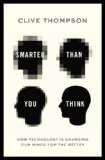
Smarter Than You Think: How Technology is Changing Our Minds for the Better by Clive Thompson (Penguin, 2013)
(kindle ed.), (amazon.co.uk)
Book description from the publisher:
It’s undeniable—technology is changing the way we think. But is it for the better? Amid a chorus of doomsayers, Clive Thompson delivers a resounding “yes.” The Internet age has produced a radical new style of human intelligence, worthy of both celebration and analysis. We learn more and retain it longer, write and think with global audiences, and even gain an ESP-like awareness of the world around us. Modern technology is making us smarter, better connected, and often deeper—both as individuals and as a society.
In Smarter Than You Think Thompson shows that every technological innovation—from the written word to the printing press to the telegraph—has provoked the very same anxieties that plague us today. We panic that life will never be the same, that our attentions are eroding, that culture is being trivialized. But as in the past, we adapt—learning to use the new and retaining what’s good of the old.
Thompson introduces us to a cast of extraordinary characters who augment their minds in inventive ways. There’s the seventy-six-year old millionaire who digitally records his every waking moment—giving him instant recall of the events and ideas of his life, even going back decades. There’s a group of courageous Chinese students who mounted an online movement that shut down a $1.6 billion toxic copper plant. There are experts and there are amateurs, including a global set of gamers who took a puzzle that had baffled HIV scientists for a decade—and solved it collaboratively in only one month.
Smarter Than You Think isn’t just about pioneers. It’s about everyday users of technology and how our digital tools—from Google to Twitter to Facebook and smartphones—are giving us new ways to learn, talk, and share our ideas. Thompson harnesses the latest discoveries in social science to explore how digital technology taps into our long-standing habits of mind—pushing them in powerful new directions. Our thinking will continue to evolve as newer tools enter our lives. Smarter Than You Think embraces and extols this transformation, presenting an exciting vision of the present and the future.
Google Books preview:
See also: Book website
Comments (0)
- cognitive science,culture,new books
September 10, 2013
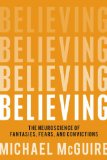
Believing: The Neuroscience of Fantasies, Fears, and Convictions by Michael McGuire (Prometheus, 2013)
(kindle ed.), (amazon.co.uk)
Book description from the publisher:
A new book about brain chemistry, neural systems, and the formation of beliefs from the scientist who brought to light serotonin’s many crucial roles in human behavior.
Beliefs: What are they? How have evolution and culture led to a brain that is seemingly committed to near endless belief creation? And once established, why are most beliefs so difficult to change? Believing offers answers to these questions from the perspective of a leading neuroscientist and expert in brain-behavior research.
Combining personal anecdotes and the latest research, Dr. McGuire takes the novel approach of focusing on the central and critical role of brain systems and the ways in which they interact with the environment to create and maintain beliefs. This approach yields some surprising and counterintuitive conclusions:
• The brain is designed for belief creation and acceptance.
• It is biased in favor of its own beliefs and is highly insensitive to disconfirming evidence.
• It prefers beliefs that are pleasurable and rewarding to those that are unfavorable.
• Beliefs are “afterthoughts” of unperceived brain activities; they don’t cause behavior.
• Our consciousness has minimal influence on the neural systems that create beliefs.
Based on these observations, McGuire concludes that for the foreseeable future people will continue to hold a multitude of beliefs, many of them intransigent.
Comments (0)
- cognitive science,new books
September 7, 2013
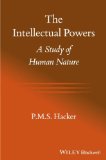
The Intellectual Powers: A Study of Human Nature by P.M.S. Hacker (Wiley-Blackwell, 2013)
(amazon.co.uk)
Book description from the publisher:
The Intellectual Powers is a philosophical investigation into the cognitive and cogitative powers of mankind. It develops a connective analysis of our powers of consciousness, intentionality, mastery of language, knowledge, belief, certainty, sensation, perception, memory, thought, and imagination, by one of Britain’s leading philosophers. It is an essential guide and handbook for philosophers, psychologists, and cognitive neuroscientists.
- The culmination of 45 years of reflection on the philosophy of mind, epistemology, and the nature of the human person
- No other book in epistemology or philosophy of psychology provides such extensive overviews of consciousness, self-consciousness, intentionality, mastery of a language, knowledge, belief, memory, sensation and perception, thought and imagination
- Illustrated with tables, tree-diagrams, and charts to provide overviews of the conceptual relationships disclosed by analysis
- Written by one of Britain’s best philosophical minds
- A sequel to Hacker’s Human Nature: The Categorial Framework
- An essential guide and handbook for all who are working in philosophy of mind, epistemology, psychology, cognitive science, and cognitive neuroscience
See also: Author website
Google Books preview:
Comments (0)
- cognitive science,consciousness,new books,philosophy of mind
August 28, 2013
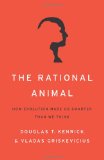
The Rational Animal: How Evolution Made Us Smarter Than We Think by Douglas T. Kenrick and Vladas Griskevicius (Basic Books)
(kindle ed.), (amazon.co.uk)
Book description from the publisher:
Why do three out of four professional football players go bankrupt? How can illiterate jungle dwellers pass a test that tricks Harvard philosophers? And why do billionaires work so hard—only to give their hard-earned money away?
When it comes to making decisions, the classic view is that humans are eminently rational. But growing evidence suggests instead that our choices are often irrational, biased, and occasionally even moronic. Which view is right—or is there another possibility?
In this animated tour of the inner workings of the mind, psychologist Douglas T. Kenrick and business professor Vladas Griskevicius challenge the prevailing views of decision making, and present a new alternative grounded in evolutionary science. By connecting our modern behaviors to their ancestral roots, they reveal that underneath our seemingly foolish tendencies is an exceptionally wise system of decision making.
From investing money to choosing a job, from buying a car to choosing a romantic partner, our choices are driven by deep-seated evolutionary goals. Because each of us has multiple evolutionary goals, though, new research reveals something radical—there’s more than one “you” making decisions. Although it feels as if there is just one single “self” inside your head, your mind actually contains several different subselves, each one steering you in a different direction when it takes its turn at the controls.
The Rational Animal will transform the way you think about decision making. And along the way, you’ll discover the intimate connections between ovulating strippers, Wall Street financiers, testosterone-crazed skateboarders, Steve Jobs, Elvis Presley, and you.
Book trailer:
See also: Book website
Comments (0)
- cognitive science,human evolution,new books







